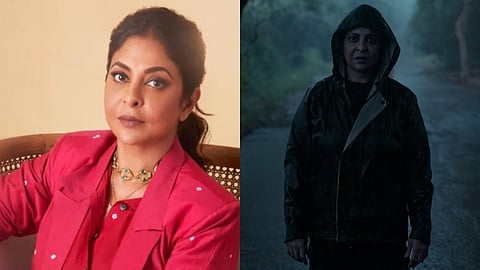

When the first season of Delhi Crime dropped in 2019, Shefali Shah was still three years away from giving a vulnerable, sublime performance as Shailaja in Three of Us (2023). Rasika Dugal was yet to be part of chamber dramas like Fairy Folk (2024) and Lord Curzon Ki Haveli (2025), and Rajesh Tailang hadn’t led a family comedy like Bakaiti (2025) and, in the process, collaborate with Sheeba Chadha for the third time. With the third season of Delhi Crime releasing this week, a lot has changed for both the characters that constitute the investigative team at its centre, and also for the actors that play them. “I remember, in the first season, I had to ask the makeup team to ensure I had dark circles around my eyes to show the toll the case has taken over my character,” says Rasika, who plays the initially wide-eyed, now hardened cop Neeti Singh. “This time, I didn’t need to. I had developed some natural ones,” she quips.
“Both my character and I, as an actor, have evolved so much in all these years,” adds Rajesh, who plays Inspector Bhupendra Singh, the conscience keeper of Shefali’s no-nonsense “madam-sir” Vartika Chaturvedi. “But you are still wary of repeating yourself. It’s important to maintain freshness in characters.” But isn’t that tricky, when there is the inevitable possibility of sequel fatigue? “It actually comes naturally,” says Shefali. “If you take this interview, for example, all of us would be reacting differently half an hour later to the same questions. I don’t think actors can be stuck in one mould. Which is great.”
The first season of Delhi Crime was based on the harrowing Nirbhaya case. The sequel explored the class divide in the capital through a gang committing copycat robberies, similar to those of the infamous Kachcha-Baniyan thieves. This time, the series aims to unravel the interconnected, claustrophobic web of human trafficking. There is a new nemesis too: Badi didi, the queen-spider pulling the strings, played by Huma Qureshi. Sayani Gupta also joins in as her trusted aide. “Every season, while choosing a new case, our quest is always to go bigger and venture into new emotional spaces,” says creator Tanuj Chopra, who took over the reins of the show from Richie Mehta after his exit post the first season. “This time, we got interested in the Baby Falak case and used it as a starting point to explore the world of human trafficking.” The case pertains to an incident in 2012, where a two-year-old girl was brought to AIIMS Delhi by a teenager who claimed to be her mother. The child had a fractured skull and human bite marks on her body. “We took the pieces from the real case and put them together to see how it is expanding the show. Then we went on to invent other parts too,” adds Tanuj.
In its third outing, the show is also expanding its jurisdiction beyond the boundaries of the capital. In addition to Delhi, the action also takes place in Haryana and Assam. The Northeast has become a new fascination for makers of OTT shows. Earlier this year, the second season of Paatal Lok, another Delhi noir, revolved around a case that branches out in Nagaland. The upcoming third season of The Family Man also has some business in the Northeast. “For me, it was just a metaphor for Vartika’s isolation,” says Tanuj. In the opening episode, Shefali’s Vartika is posted in Assam. “It’s a punishment posting, to a place far away from the urban centres she is used to managing. It was a way to show that no matter the region, Vartika is the same person, trying to do the right thing wherever she goes.”
Across seasons, Shefali plays Vartika with a dependable sturdiness. She is an actor whose eyes bear everything, from vulnerability to authority. “Honestly, I am just feeling like the character,” she explains. “Shefali, the actor, is not calculating how to react. It’s just Vartika who is imbibing, expressing. Also, we, as cinema actors, have the privilege of the camera. If you can convey something in two words, don’t use four, and even if those two are not needed, go for silence, it’s the universal language.”
“She makes it sound so easy,” says Sayani, with a laugh. “I actually have not seen either season 1 or 2,” she confesses. “When the first one came out, the Nirbhaya case was still fresh in my mind. I was afraid of being triggered. And I couldn’t get myself to see the subsequent one since I hadn’t seen the first. But I knew what the actors are capable of and the pitch of the series, so that was enough to assimilate myself.”
For Sayani, it might be about blending in, but for Rasika, it was about growing out. Her character Neeti starts as a naïve IPS trainee who gets disillusioned by her job and the world by the end of the first season. “It’s always troubling to realise that the world is not the place you thought it would be,” says Rasika. “I feel so close to Neeti as a character because her journey and mine have been similar. I was also that idealist college graduate from Delhi University who thought that the truth could change the world. But now I am older and wiser, and like Neeti I have also learnt to work from within the system.”